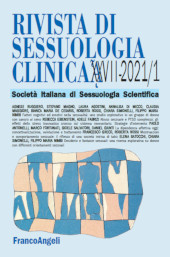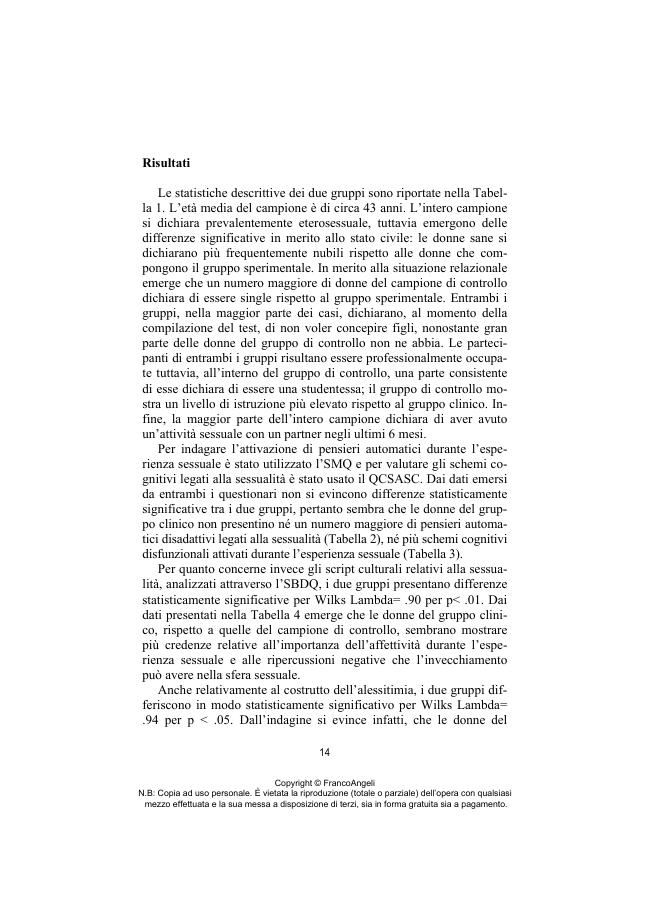Fattori cognitivi ed emotivi nella sessualità : uno studio esplorativo in un gruppo di donne con cancro al seno
5-22 p.
Il carcinoma mammario rappresenta la neoplasia maligna più diffusa nella popolazione femminile e, nonostante i significativi progressi nella diagnosi e nel trattamento, essa si configura come la neoplasia con la più alta mortalità tra le donne in Occidente. La diagnosi e le terapie rappresentano non solo uno sconvolgimento sul piano fisico della donna, ma hanno spesso delle conseguenze significative nella sfera emotiva, cognitiva, relazionale e sessuale delle pazienti e dei loro cari. Per quanto concerne la sfera sessuale, molti studi hanno evidenziato che le donne con diagnosi di carcinoma mammario hanno più probabilità, rispetto alle donne sane, di sviluppare disfunzioni sessuali. Partendo da questo dato l'obiettivo dello studio è quello di osservare l'eventuale relazione tra aspetti cognitivi e emotivi e le disfunzioni sessuali nelle donne con carcinoma mammario.
Sono stati indagati l'alessitimia, i pensieri automatici, gli script culturali e gli schemi cognitivi, quali fattori che possono caratterizzare l'esperienza sessuale di donne con tumore al seno. Lo studio è stato condotto su donne affette da carcinoma mammario che statisticamente sembrano sviluppare più frequentemente disfunzioni sessuali, rispetto alle donne sane. I risultati emersi sembrano indicare che le donne del gruppo clinico evidenziano sia livelli più alti di alessitimia, sia un numero più elevato di credenze disfunzionali inerenti alla sfera sessuale, rispetto al gruppo di controllo. Partendo da questi elementi si potrebbero effettuare non solo utili lavori preventivi dell'insorgenza dei disturbi sessuali nelle donne con carcinoma, ma anche efficaci interventi per contrastare il mantenimento di queste disfunzioni, avvalendosi di tecniche cognitivocomportamentali, di ristrutturazione cognitiva ed introspettive. [Testo dell'editore].
Breast cancer represents the most common malignant cancer in the female population and it is the cancer with the highest mortality in the world's female population. It has been shown in the literature that women with breast cancer are more likely to develop sexual dysfunction than healthy women; women with breast cancer often develop difficulties in their body image and feminility, because cancer affects a secondary sex organ. The aim of current study was to explore the relationship between sexual dysfunction and cognitive or emotional factors in women with breast cancer, in particular we investigated the construct of alexithymia, cognitive schemas, automatic thoughts and sexual dysfunctional beliefs. The study was conducted on 156 women, divided in two groups: 60 women with breast cancer and 96 healthy women.
The women of the clinical group have been recruited in the departments of senological oncology and integrated therapies of the Policlinico Agostino Gemelli in Rome and the women of the control group were randomly extrapolated from the database of the Clinical Sexology Institute (ISC) of Rome. All women completed 4 selfreport questionnaire: Questionnaire of Cognitive Schema Activation in Sexual Context (QCSASC), Sexual Dysfunctional Beliefs Questionnaire (SBDQ), Sexual Modes Questionnaire (SMQ) to explore cognitive factors and Toronto Alexithymia Scale (TAS20) to assess emoctional aspects. MANCOVA statistical analysis was used to highlight statistically significant differences between the two groups; the covariates included were age, level of education and relational situation. Also it was used the Chi2 test for frequencies. Analysis of the data shows that women with breast cancer have higher levels of alexithymia and more dysfunctional beliefs in the sexual sphere than healthy women.
Regarding to sexual beliefs, women in the clinical group perceive feelings as very important during sexual activity and consider the advancement of the chronological age a negative element for the sexual sphere. Previous research shows that also women with sexual dysfunction believe that aging negatively affects sexuality; therefore this beliefs seems to be common to women with breast cancer and women with sexual dysfunction. In women with breast cancer, this dysfunctional belief could be emphasized by the iatrogenic induction of menopause. Regarding to alexithymia, women with breast cancer show higher scores in the subscale "difficult to identifying feeling" and "externallyoriented thinking".
These results are partly in line with current literature, infact some studies have shown that women with breast cancer have more difficult to identify their feelings than healthy women, while according to other research there aren't significant differences in the alexithymia construct between women with breast cancer and healthy women. Finally in the questionnaires assessing automatic thoughts and cognitive schema there aren't significant differences between clinical and control group. Future research could contribute to a better understanding of the role of cognitive and emotional aspects on the sexuality in women with breast cancer; prevention and treatment of sexual dysfunction and quality of life of women with breast cancer could be improved.
The study has some limitation such as lack of previous scientific studies; this gap partially compromises the quality of the discussion of data emerged by the study and urges us to conduct further research, since this information could improve quality of life and health sex of women with cancer. Also the length of the protocol represents a limitation of the study, as it may have altered the reliability of the results; furthermore the research protocol is based exclusively on selfreport questionnaires. Finally, there are significant differences related to age, educational level and relationship situation between two groups; however, to limit this problem, these variables have been included as covariates in MANCOVA statistical analysis. [Publisher's text].
Is part of
Rivista di sessuologia clinica : 1, 2021-
Articles from the same issue (available individually)
-
-
Information
ISSN: 1972-5183
KEYWORDS
- cancro, sessualità, schemi cognitivi, emozioni, credenze sessuali
- cancer, sexuality, emotion, cognitive schema, sexual beliefs



